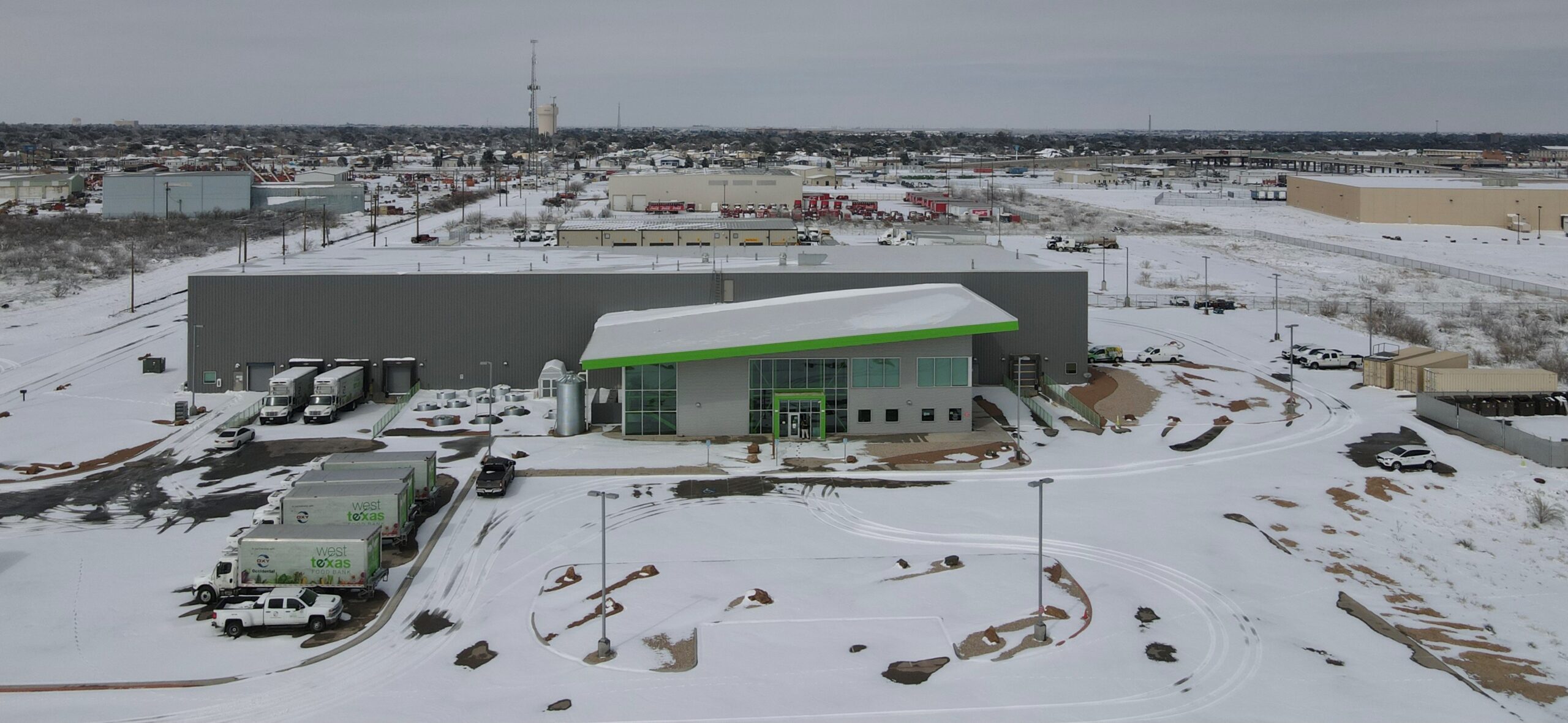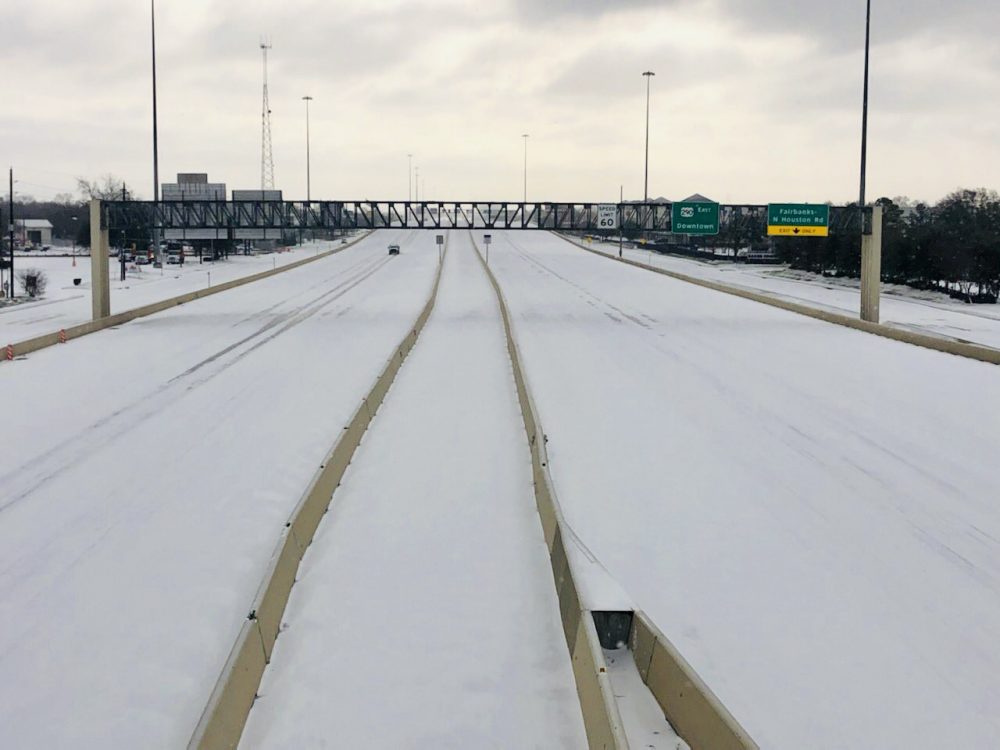Announcing grants to support recovery from February winter storms
I live in Texas – a disaster-prone state. So, as I begin to assess the recovery needs and the opportunities for grantmaking following a disaster event, my lived experiences help inform my work. For example, I lived through Hurricane Harvey. Though I wasn’t directly affected by floods or wind damage, I witnessed fellow Texans with […]

I live in Texas – a disaster-prone state. So, as I begin to assess the recovery needs and the opportunities for grantmaking following a disaster event, my lived experiences help inform my work. For example, I lived through Hurricane Harvey. Though I wasn’t directly affected by floods or wind damage, I witnessed fellow Texans with their struggles. I had a personal perspective that helped me understand what was needed and directed funds to those affected by that storm.
The same thing happened this past February as the entire state of Texas and surrounding states experienced unprecedented, extremely frigid weather that shut down our electric grid. I was lucky — privileged, honestly. We have a gas-powered fireplace and a gas stove. And we had plenty of food to eat and blankets to keep us warm. Plus, our home is newer construction, built with spray foam insulation that helped protect us from the worst of the power outages and frigid temperatures.
Again, I watched, though, as fellow Texans struggled and many died from a tragic lack of preparedness and forethought by those chosen to lead us. Layer on the trauma of an ongoing pandemic, and it was, quite literally, the perfect storm.
So, with gratitude, I was provided the opportunity, as the new director of domestic funds for the Center for Disaster Philanthropy (CDP), to direct the grantmaking for funding provided by multiple donors to support response and recovery in Texas and beyond from this weather event.
Immediate response
Though we at CDP encourage funders to consider the entire disaster cycle, and we typically support mid- to long-term recovery, one of our donors asked us to direct some of their funding to immediate response and relief. From our assessment, and, frankly, our own neighbors’ experiences, we learned that access to healthy food that didn’t require electricity to prepare or keep fresh and to safe drinking water was in high demand during and immediately after this event.
We knew that the pandemic had already increased food insecurity in some of Texas’s most marginalized populations. This event only exacerbated that problem. We quickly awarded a grant of $125,000 to Feeding Texas, which, in turn, promptly deployed the funding to 21 local food banks across the state, providing much-needed access to food and water.
Mid- to long-term recovery
The bulk of the remaining funding designated for the February storms has been granted. And, as is our norm, we provided support for mostly local organizations working on recovery from the effects of this weather event. Here are the details of those recovery grants:
Coastal Bend Disaster Recovery Group (CBDRG) – A grant of $63,933 for funding a project manager and case managers to assist families adversely affected by the winter storm in communities and colonias in the Coastal Bend of Texas.
CBDRG restores the essential plumbing and repairs damages to homes for those who lack access to other resources. They also continue to assist clients who are still recovering from the damage to their homes due to Hurricane Harvey, as these are layered traumas on these communities.
East Harris County Empowerment Council (EHCEC) – A grant of $120,000 for funding a disaster case manager/program manager to support the recovery work necessary for the many affected households in this part of the county.
EHCEC is led by and serves Black, Indigenous, and People of Color (BIPOC)- communities based in a high-need, mostly unincorporated area of Harris County. It does not typically receive the resources to which other parts of the metropolitan area have access. This team acts as the local long-term recovery group for their unincorporated communities and has done so since severe floods in 2015 and 2016, and when Hurricane Harvey devastated the area.
Galveston County Long Term Recovery Group – A grant of $104,000 to increase the resiliency of Galveston County to respond to any future disasters, provide outreach and identify the most at-risk residents who had winter storm damage. The group then assists them in applying for benefits and connects them with services and resources to help with recovery.
They support making needed repairs when resources from insurance and the Federal Emergency Management Agency are insufficient. They are a solid long-term recovery group with a long history of helping the citizens in their service area recover from multiple disasters. They serve a part of southeast Texas that has been devastated by numerous hurricanes.
Good360 – A grant of $125,000 to distribute much-needed supplies to partners working on recovery from the February winter storms.
Good360 is simply the go-to for us when connecting organizations to partners who can help them secure high-demand supplies and products to support recovery. They work with many of the local organizations listed here. Good360 is an excellent resource for those organizations struggling to access many of the supplies needed for this recovery.
Harmony Community Development Corporation – A $75,000 grant to provide mental health services for those experiencing post-traumatic disorders resulting in compounded trauma from the storms.
They are a BIPOC-led and mainly BIPOC-serving organization located in a marginalized community in south Dallas. Through the pandemic, they were able to expand their mental health counseling services by offering telehealth. The city and county asked Harmony to expand their trauma-informed telehealth counseling to serve those most affected by the layered traumas of these winter storms. They expanded their reach beyond south Dallas to the entire county, which created a need to expand capacity to provide services. This funding will help with that capacity expansion.
Houston Responds (SW Louisiana Responds) – With this grant, we leveraged the power of multiple internal funding streams to directly support the work of a local partner working not just in Texas, but in Louisiana.
Houston Responds is neither just in Houston nor just responding. And their congregational volunteers do recovery work to support communities affected by the winter storms and by Hurricanes Laura and Delta. This $160,000 grant will unite, empower and mobilize churches throughout southeast Texas and southwest Louisiana to expedite recovery through increased volunteer engagement and expanded repair capacity to serve families affected by all of these weather events.
Orange County Disaster Rebuild (OCDR) – This is another example of collaborative grantmaking from multiple CDP funding options. We granted $162,768 to build organizational capacity to respond to the multiple storms affecting Orange County in southeast Texas.
This grant allows OCDR to hire a volunteer coordinator, a disaster case management supervisor and a project manager to work with clients affected by any or all of these events, without restrictions typically created by funding for a single event’s impact.
Texas Alliance of Child and Family Services – This grant for $125,000 provided direct cash assistance to foster families throughout Texas affected by power outages and freezing temperatures during the winter storms.
There is already a shortage of foster families in the state, and these children already experience significant trauma. Because this organization works statewide, its reach is statewide. Grants provided families with a small stipend to help them repair homes and replace items destroyed by the storm.
Texas Tribune – A grant of $75,000 provides Texans access to nonpartisan news and information about the winter storm and related issues.
The Texas Tribune team provides robust journalism when the need for it is more significant than ever. It is crucial to keeping Texans safe while holding officials accountable. Continuing to raise awareness of the ongoing challenges and opportunities related to the winter storm — particularly for marginalized communities — is vital as multiple issues vie for lawmakers’ attention.
United Way of Grayson County – A grant of $140,000 to provide immediate services for rent, utilities, extended motel stays, home repairs, case coordination and basic need supplies for community members in Fannin County and Grayson County.
This area comprises 37 cities and towns and has the third-largest senior citizen population in Texas. These communities are home to many retired seniors and immigrants, migrants and low-income people working in plants and distribution centers or on farms and ranches.
Victoria County Long Term Recovery Group (VCLTRG) – A grant of $110,000 to provide short-term immediate plumbing supplies and plumbing repair assistance with skilled volunteers or plumbing contractors to homeowners and renters in Victoria and surrounding counties. VCLTRG also replace water heaters that were lost during the severe freeze.
The Victoria County Long Term Recovery Group was one of the first organizations we supported with the Hurricane Harvey Recovery Fund. They have grown from a fiscally sponsored group of community leaders to now a well-run community support system. Many homeowners and renters experienced issues from the deep freeze in this area and struggled to get things back to normal. The VCLTRG quickly responded to support their neighbors and pivoted a group of volunteers working on Hurricane Harvey recovery to help those now affected by burst pipes and lack of water.
What’s next?
Working with my colleague, Cari Cullen, who directs the Midwest Early Recovery Fund, we have an additional funding opportunity to support recovery from these storms in Oklahoma. Once again, we will fund collaboratively across different CDP funds. We’ll have more details about that soon.
Though CDP did not have a fund set up expressly to support recovery from the winter storms that devastated several southern states – especially my home state of Texas – we are grateful for the continued support of generous donors. They honor our expertise in disaster philanthropy by providing us the opportunity to do what we do best – support long-term recovery from disaster for marginalized communities most disproportionately affected by them.
Especially in this case, I get to see up close the effects these grant funds have on our communities. So, with that, I say a hearty THANKS, Y’ALL – to our donors and these amazing organizations doing the work!
More like this

